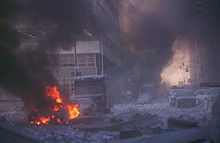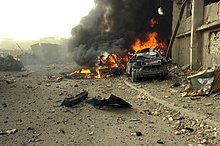The echo of memory
Richard Powers ' ninth novel, The Echo Maker (original title The Echo Maker ) from 2006 tells the story of an accident victim, a young man from Nebraska , who no longer recognizes after severe head injuries his next of kin. In his desperation he develops explanations for a world that suddenly appears to him to be a forgery in crucial details.
The book won the National Book Award .
content

For inexplicable reasons, the 27-year-old Mark Schluter skidded with his pick-up on a dead straight road. Only hours later, the fire brigade, alerted by strangers, welded him out of the wreck. After a long coma, he wakes up, but has no memories of the accident. Tire tracks from other cars at the scene of the accident and a mysterious message puzzled the police. Devotedly cared for by his sister Karin and the attractive nurse's helper Barbara, Mark finds it difficult to get back to life. But his brain seems incurably damaged; he shows symptoms of Capgras syndrome , a rare mental illness in which close partners appear to be replaced by identical looking doppelgangers . Mark's illness attracts famous neurologist Gerald Weber, who is interested in Mark as a case study for his next publication. From the distorted perspective of the patient, who develops increasingly paranoid delusions, and the medical perspective of the aging scientist, a critical view of the infantile and at the same time destructive American world develops.
The novel confronts these contemporary events with an archaic event, the bird migration of the sandhill cranes , which have been stopping for a few weeks in the region around the Platte River near Kearney on their migration to Alaska for thousands of years . For this species humans are becoming a danger, the water level of the Platte River continues to sink, providing the birds with resting places and food on their way. The characters in the action are drawn into the environmental disputes. Mark's unrecognized sister Karin resumes her previous relationship with the environmentalist and head of the crane station Daniel as well as with the representative of a real estate project that wants to benefit from the cranes and at the same time endanger their world.
After various unsuccessful rescue attempts by the doctors, Mark's hope is increasingly focused on clarifying the cause of the accident. Again and again he tries to find out whether and how people around him were involved in the accident. As absurd as this thought of a mentally ill person may seem at first, it is gaining more and more shape. Apparently his best friends were somehow involved in the accident. The nurse's assistant Barbara also suddenly seems suspicious. After a suicide attempt by Mark, people open up, the truth emerges, life's lies are broken. In the end, healing prospects develop for Mark; The neurologist, who was so self-confident at first, is broken by the terrifying insights into the complexity of the human psyche.
subjects
The novel largely reflects the human ego, consciousness as the highest product of evolution. From the perspective of the famous neuroscientist as well as from the patient's distorted perceptions, the unity of our perceptual world appears ever more dubious.
“The novel The Echo of Memory has something of a neuroscientific-psychological experimental arrangement. Power's cardinal questions that drive the plot are: How does the human mind construct its environment? Is there free will? Is the I more than a chimera? "
Mark's analytical thinking also works after the accident, but his findings are no longer linked to the appropriate emotions. In this irritating situation, his ego looks for “logical” explanations: Who is this woman who is so similar to his sister, but who leaves him emotionally completely cold? It can only be an enormously sophisticated replication. But who has the power to carry out such manipulations? What are the interests behind it? A paranoid world of conspiracy theories develops, which, due to its ice-cold logic, is increasingly unsettling the people around Mark Schluter.
“Powers' stated intention, however, is to make the reader doubt his own consciousness. The interesting thing about Capgras is precisely that it makes the dependence of our analytical skills on the emotional ones dramatically clear. "
The novel begins about six months after the attacks of September 11th on February 20th, 2002 and tells the time up to the Iraq war . If the paranoia initially only affects the sick, the whole country gradually seems to be shaped by fear and hysteria. Mark's best friend volunteers for the National Guard and is finally sent to Iraq. TV images of war and violence are omnipresent. Powers novel avoids any concrete partisanship, but tends towards fundamental cultural criticism. The development of civilization is becoming a danger for all of humanity, which is particularly illustrated by the ever new confrontation with the primeval life of the cranes. Powers sees "something of political capgrass" in terror and violence. The novel gloomily prophesies the revival of nature - long after the fall of mankind.
Another theme of the novel is the people of Kearney, Nebraska, the geographic center of the United States. It depicts rather small people, slaughterhouse workers like Mark and his friends, nurses, pioneer actors, small office workers like Mark's sister Karin, unsuccessful people. The big world is only a guest here when passing through or on the omnipresent television. Car hairdressing, computer games, poor houses off the rack. Real life is elsewhere - if it weren't for the cranes. Nevertheless, Powers aims here at the center of America, at nationalism and prejudice, at loss of identity, intrigue and existential hardship.
“If you enter 'Kearney, Nebraska' on Google Earth, you will hit the heart of America. A direct hit. A place that, by its coordinates, is more than just a meeting place for 25,000 souls. It is the geographical center of America, the center in which everything that can be said about this country should be bundled if you set your sights on it as the setting for a novel: the landing place for the 'Great American Novel' and not just for half a million Sandhill cranes that stop here every February on their way to Alaska. Forty-nine year old Richard Powers doesn't do it below. As a heavyweight writer, he finds the big world even in the smallest nest. Everything is explained: from 9/11 to the war on terror, from ecology to cultural criticism, from flat rates to multi-player online games, not to forget brain research. "
shape
The Süddeutsche Zeitung was of the opinion that Powers' book was not just a novel, but “a scientific work on the neurology of the inability to perceive oneself as I, one's neighbor as you, and society as an assembly of individuals who remain unified and unified in themselves . It is an exact, extremely vivid inventory of the blessings and misfortunes that came upon man when he learned to recognize the stuff his self is made of - and this misfortune has grown immeasurably since then, over and over again to a surprisingly high degree, able to decide for himself what happens to his ego, also in the form of operations and medication. Therefore the book is also a philosophical work about the basic question of modern man: about what holds him together spiritually. And all of this happens, amazingly enough, without any loss of tension or literary power. "
The American title The Echo Maker has a double meaning. In the language of the Indians, it describes the cranes and their reputation. But it also describes the echoes of memory that shape and shape our self.
"Mark thus becomes a sort of echo maker. He thinks, for instance, that his house, 'The HomeStar', and his dog, Blacky, have been taken somewhere else, and that a fake HomeStar and a fake Blacky exist in their places, exact in every detail but fake nonetheless. "
If the title already contains the basic conflict between endangered nature and the fragile human ego, Powers develops the five parts of his book from the lines of a mysterious note that Mark's sister Karin finds on her unconscious brother's bed:
- Part 1: "I am nobody"
- Part 2: "but tonight on the North Line Road"
- Part 3: "GOD led me to you"
- Part 4: "so that you can live"
- Part 5: "and bring someone back"
Richard Powers' complex narrative of science, modern life and archaic nature is largely written from Sister Karin's perspective. But there are also passages in which the story is told from the point of view of the doctor Gerald Weber or the patient Mark Schluter. The patient's thoughts are inevitably the least comprehensible to the reader and seem absurd. Despite the intricate plot , the novel retains the charm of oral storytelling.
““ There is a very simple reason for that, ”he says. “Many writers read their drafts aloud to see if the melody of their prose is right. By not writing the texts, but speaking them, I do two otherwise separate work steps in one, as it were. You probably know that music is an important source of inspiration for me. ""
Powers creates tension. His exploration of the depths of the human psyche is tied into a dramatic plot that is becoming increasingly acute. Margaret Atwood of the New York Review of Books therefore thinks that you have to read the book twice, because on the first pass, carried away by the pull of the narrative, you overlook many details. As a result of the research into the cause of the devastating accident, the novel not only bears the traits of a psychological and political drama, but also the effects of the crime novel .
Reviews

Power's novel was received largely enthusiastically by the Anglo-Saxon press. New York Review of Books critic Margaret Atwood humorously writes that Powers gets reviews that other writers would kill their grandmother for. His education and his intellect, his ability to deal with complex topics in an understandable way are widely praised.
"The Echo Maker is a grand novel - grand in its reach, grand in its themes, grand in its patterning. That it might sometimes stray over the line into the grandiose is perhaps unavoidable: Powers is not a painter of miniatures. "
- “The Echoes of the Memories is a great novel - great in its scope, great in its subjects, great in its design. The fact that he sometimes crosses the border to the bombastic is perhaps inevitable: Powers is not a miniature painter. "
Patrick Ness also finds words of praise in his review I am No One in the Guardian:
- "The Echo Maker turns out, happily, to be Powers' most accessible novel to date, showing an ever-increasing skill at marrying his titanic smarts to plots that move and breathe. It is, as so many of his novels are, a story about the terrible flexibility of identity. "
- The Echoes of Memory fortunately turns out to be Powers' most accessible novel to date. He shows the growing ability to combine his titanic wisdom with plots that breathe and live
Ness sees the cranes as the book's central metaphor. They embodied the eternal cycle of birth and rebirth and archaic memory. Contrary to the fragility of human memories, the cranes called each other over the millennia, as an old Cherokee wisdom maintains. They had the sure and instinctive recognition ability that Mark Schluter lacks.
The German literary criticism judged more differentiated. In her review of the time, Tanya Lieske spoke of a "completely new type of novel", a cross between "brain research and contemporary novels" and sees it as not only positive:
“If you also take into account the author's wise interests, in a loose order these are quantum physics, the theory of time, virtual reality or even genetic engineering, Richard Powers' tendency towards literary experiments is self-explanatory. To say it in advance, that doesn't just do glad. Reading his latest novel, The Echo of Memory, makes you feel like a guest in a scientific laboratory. You can watch how the author lays out his test chains in a neat order, involves various test persons in circumstances, then checks them for cause and effect. "
For Lieske, the best passages in the novel are the dense descriptions of the cranes, a dormant pole in the flow of the novel with its countless ramifications and sprinkles.
In the FAZ , Peter Körte criticizes the sweeping descriptions under the title Die Kraniche des Pfiffikus Powers', which unnecessarily always end with a summary that they lack the sharpness of Don DeLillo . The story also suffers from the excessive burden of meaning.
“Richard Powers lacks the lacony, the ease in dealing with the world that characterizes so many great American novels; and he does not want to be satisfied with the horizon of his protagonists, who, if only portrayed precisely enough, will all by themselves point beyond themselves. He has to put thoughts in people's heads or put words in their mouths that look very strange there. "
So his figures sometimes looked like woodcut and typified. Karin's old and new lover Daniel, for example, is exclusively an environmentalist and do-gooder from the provinces, Karin “little more than the suffering victim”. The neurologist Gerald Weber is so unmistakably Oliver Sacks "that he should actually mistake his wife for a hat". Weber determined the narrator's perspective; the Kearney provincials were increasingly appearing as case studies for mental disorders.
“The deep crisis of meaning of the neurologist, who consistently takes the last look in the novel, must attest that the analytical sciences can only seek their salvation in the narrative. And then one would like to call out to Powers, even if the terminology sounds a little bureaucratic, with Habermas that telling and explaining now formulate different claims to validity; that the ways in which we try to figure out the world are not easily resolvable for good reason. But it's too late for that. Powers is so fulfilled with his mission that in the end the novel tells less than talks about the power of storytelling. "
text
- Richard Powers: The Echoes of Memory. Original title: The Echo Maker. Translation Manfred Allié , Gabriele Kempf-Allié, S. Fischer Verlag, Frankfurt am Main 2006, ISBN 3-10-059022-8 .
literature
- Marco Stahhut: The Smartest Writer in the World: Interview with Richard Powers. In: Welt Online , November 26, 2006
- Margaret Atwood: In the Heart of the Heartland. In: The New York Review of Books. Volume 53, Number 20, December 21, 2006
- Tanya Lieske: Tanya Lieske: Last refuge at the bend of the river . In: Die Zeit , No. 3/2007
- Peter Körte: The Cranes of the Pfiffikus. This is how the nerd writes: Richard Powers messes up his novel. In: FAZ , December 4, 2006
Web links
- Review notes at perlentaucher.de
- Brigitte Neumann: Review ( memento from March 31, 2009 in the Internet Archive ) at NDR-Kultur
- Gertrud Lehnert: Review on Deutschlandradio
- Review in the Guardian
References and comments
- ↑ dradio.de, accessed on August 3, 2011
- ↑ Marco Stahhut: The Smartest Writer in the World: Interview with Richard Powers. In: Welt Online , November 26, 2006
- ↑ Marco Stahhut: The Smartest Writer in the World: Interview with Richard Powers. In: die welt online from November 26, 2006
- ↑ a b c Peter Körte: The cranes of the Pfiffikus . In: FAZ , December 4, 2006
- ↑ Thomas Steinfeld: Süddeutsche Zeitung , October 4, 2006
- ↑ "The wildly disparate elements in The Echo Maker are the endangered sandhill cranes - known to American Indians as 'the echo makers' because of their sonorous calls - and their migratory stopover on the Platte River in flat, flat, flat Nebraska." Margaret Atwood: In the Heart of the Heartland. In: The New York Review of Books. Volume 53, Number 20, December 21, 2006, nybooks.com, accessed August 3, 2011
- ^ Margaret Atwood: In the Heart of the Heartland. In: The New York Review of Books. Volume 53, Number 20, December 21, 2006, nybooks.com, accessed August 3, 2011
- ↑ See. This Powers' eighth novel, The Time of Our Singing ( The Time of Our Singing ), which he published in 2003.
- ↑ Marco Stahhut: The Smartest Writer in the World: Interview with Richard Powers. In: Welt Online , November 26, 2006
- ↑ "Powers is in the third category: the second time through is necessary to pick up all the hidden treasure-hunt clues you might have missed on your first gallop through the plot. You do gallop, because Powers can plot. " Margaret Atwood: In the Heart of the Heartland. In: The New York Review of Books. Volume 53, Number 20, December 21, 2006, nybooks.com, accessed August 3, 2011
- ↑ "That sort of thing puts a critic on notice, and indeed Powers has gathered critical comments that most writers would kill their grannies for." Margaret Atwood: In the Heart of the Heartland. In: The New York Review of Books. Volume 53, Number 20, December 21, 2006 nybooks.com on August 3, 2011
- ^ Margaret Atwood: In the Heart of the Heartland. In: The New York Review of Books. Volume 53, Number 20, December 21, 2006 ( nybooks.com, accessed August 3, 201)
- ↑ Guardian unlimited from January 6, 2007
- ↑ Tanya Lieske: Last refuge at the bend of the river . In: Die Zeit , No. 3/2007
- ↑ Peter Körte: The cranes of the Pfiffikus. This is how the nerd writes: Richard Powers messes up his novel. In: FAZ , December 4, 2006
- ↑ nybooks.com.Retrieved August 3, 2011





